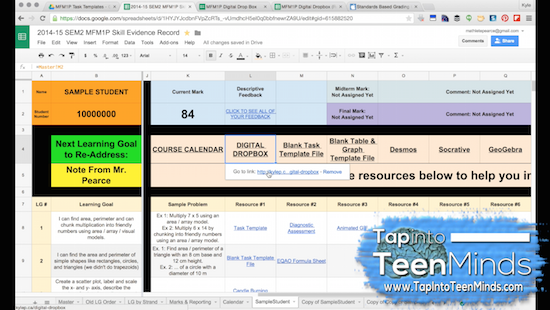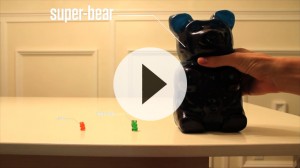 I have always liked the idea of a "foldable". I think they were popularized in Dinah Zike's book Teaching Math with Foldables. Well there are some that have used these to have their students make "interactive notebooks" (INBs). One who is quite prolific is Elissa Miller (Miss Calcul8). Very recently she has shared quite a few examples of her INBs on her blog. Check them out below, including all the downloadable templates in Word and PDF format. There is stuff that ranges from grade 7 geometry all the way to grade 12 Advanced functions:
I have always liked the idea of a "foldable". I think they were popularized in Dinah Zike's book Teaching Math with Foldables. Well there are some that have used these to have their students make "interactive notebooks" (INBs). One who is quite prolific is Elissa Miller (Miss Calcul8). Very recently she has shared quite a few examples of her INBs on her blog. Check them out below, including all the downloadable templates in Word and PDF format. There is stuff that ranges from grade 7 geometry all the way to grade 12 Advanced functions:Curriculum Tags: Gr7, Gr8, MPM1D, MFM1P, MPM2D, MFM2P, MBF3C, MCF3M, MCR3U, MHF4U
Characteristics of Functions
Solving Quadratics with Square roots (with a Row Game)
Properties of Triangles and Angles
 Angles and Lines
Angles and LinesTransformations
The Unit Circle
Trig Basics (with Radians)
Factoring Quadratics
 We are a little behind on our resource blog but here is a new post. This one is an activity dealing with multiple representations of quadratics to put kids into groups of three. Each student gets one card and they have to find the two other students that have different representations of the same relationship. Get all the downloads here.
We are a little behind on our resource blog but here is a new post. This one is an activity dealing with multiple representations of quadratics to put kids into groups of three. Each student gets one card and they have to find the two other students that have different representations of the same relationship. Get all the downloads here.Curriculum Tags: MPM2D, MBF3C, MCF3M, MCR3U
http://engaging-math.blogspot.ca/2015/03/sort-students-into-groups-using.html

Calculating the probability from a normal distribution can be a bit tedious (using a z score table). So it is probably a good idea to have a probability calculator. Here is a good one. You enter the mean, standard deviation and the range you wish to calculate from and it uses the integral of the normal curve to calculate the area under the curve to get the probability. And as an added bonus, you get a diagram of the area. One note: if you use this calculator (or a TI-84) you will get a different answer than if you used a z-score table. This is because the z-score table is only accurate to 2 decimals, whereas this calculator or the TI-84 would be far more accurate due to the calculation method. Thanks to Mark Esping for this one.
Curriculum Tags: MDM4U
http://onlinestatbook.com/2/calculators/normal_dist.html
 I always like interesting ways to talk about combinatorics. There are some interesting apps that help out in this area. The first one is a music app. Music is always a great way to talk about combinatorics. In this case the app lets you take samples and add them together to make a song. The specific thing about this one is that all the sounds are created by the same person via their vocals (kinda like Bobby McFarren). So the combinatoric question would be about how many possible songs you could make. Just drag the symbols up to the avatars to start creating your songs.
I always like interesting ways to talk about combinatorics. There are some interesting apps that help out in this area. The first one is a music app. Music is always a great way to talk about combinatorics. In this case the app lets you take samples and add them together to make a song. The specific thing about this one is that all the sounds are created by the same person via their vocals (kinda like Bobby McFarren). So the combinatoric question would be about how many possible songs you could make. Just drag the symbols up to the avatars to start creating your songs.Curriculum Tags: MDM4U
http://www.incredibox.com/
 Another fun one is more than a few years old but it is still super fun. On this one you get to choose how the character gets to dance. You make two choices, one about how the arms move and the other for the legs. You won't be able to stop playing with this. Just try to stop long enough for your students to calculate the total number of dances. The site is Swedish so that accounts for the non english words and if you are really looking for a good time you can upload a picture of your own face on it.
Another fun one is more than a few years old but it is still super fun. On this one you get to choose how the character gets to dance. You make two choices, one about how the arms move and the other for the legs. You won't be able to stop playing with this. Just try to stop long enough for your students to calculate the total number of dances. The site is Swedish so that accounts for the non english words and if you are really looking for a good time you can upload a picture of your own face on it.Curriculum Tags: MDM4U
http://fuldans.se/
 I have had a few posts about assessment recently. And one of the flavours of the day is the idea of not assigning grades but just feedback. This really intrigues me. And if you are like me you might like this post from @D_martin05 on how grades aren't used at all. Some interesting stuff here. And if you saw my earlier posts then you might be interested in some more clarification @MathletePearce has made on his assessment method developed with @Mr_OrrGeek . Take a look at the link below to see his workflow with Google Docs.
I have had a few posts about assessment recently. And one of the flavours of the day is the idea of not assigning grades but just feedback. This really intrigues me. And if you are like me you might like this post from @D_martin05 on how grades aren't used at all. Some interesting stuff here. And if you saw my earlier posts then you might be interested in some more clarification @MathletePearce has made on his assessment method developed with @Mr_OrrGeek . Take a look at the link below to see his workflow with Google Docs.Curriculum Tags: All
http://realteachingmeansreallearning.blogspot.ca/2015/03/no-percentages-in-math.html
https://tapintoteenminds.com/2015/03/10/digital-assessment-workflow-google-drive-sheets/
 And speaking of Kyle Pearce, here he tweaks Dan Meyer's Superbear task to spread over more expectations beyond just proportional reasoning. Take a look here.
And speaking of Kyle Pearce, here he tweaks Dan Meyer's Superbear task to spread over more expectations beyond just proportional reasoning. Take a look here.Curriculum Tags: MAT1L, MAT2L, MFM1P, MPM1D, MFM2P
https://tapintoteenminds.com/3act-math/super-bear/
Curriculum Tags: Gr7
http://www.blog.republicofmath.com/the-number-3608528850368400786036725/
 I like this use of Desmos as I used to do this a lot with Geometer's Sketchpad. That is, showing that two (or more) representations may look different but have the same graphs. A great exercise to verify simplified forms.
I like this use of Desmos as I used to do this a lot with Geometer's Sketchpad. That is, showing that two (or more) representations may look different but have the same graphs. A great exercise to verify simplified forms.Curriculum Tags: All
http://teachhighschoolmath.blogspot.ca/2015/02/sometimes-un-simplified-is-better.html
 Hey, I almost forgot, it's epic PiDay this week. So here is my favourite expansion of Pi. Super fun. And if you want here is my Pinterest page and my full set of Pi Links on my Delicious page.
Hey, I almost forgot, it's epic PiDay this week. So here is my favourite expansion of Pi. Super fun. And if you want here is my Pinterest page and my full set of Pi Links on my Delicious page.Curriculum Tags: All
http://devlinsangle.blogspot.ca/2015/03/pi-day-cyclical-motion-and-great-video.html
Curriculum Tags: All
http://www.usatoday.com/story/tech/2015/03/08/mathematician-deaths/24605901/
Patrick Honner writes for the NY Times Learning network. In this article he discusses the benefits of compound interest. Take a look
Curriculum Tags: MBF3C, MCF3M, MCR3U
http://learning.blogs.nytimes.com/2015/02/11/the-power-of-saving-exploring-the-mathematics-of-compound-interest/?_r=0
Hey, one last PiDay link. It's the mug I got for Christmas. It's heat sensitive.
Curriculum Tags: All
https://www.youtube.com/watch?v=P5FKLEdXhb8
OK, they are not all great but here are 25 jokes that only math geeks will like. Or at least two of them. Follow the link for the rest.Curriculum Tags: All
https://www.youtube.com/watch?v=P5FKLEdXhb8
Curriculum Tags: All
http://www.buzzfeed.com/generalelectric/25-jokes-only-math-geeks-will-understand#.wrBeoq19k






No comments:
Post a Comment